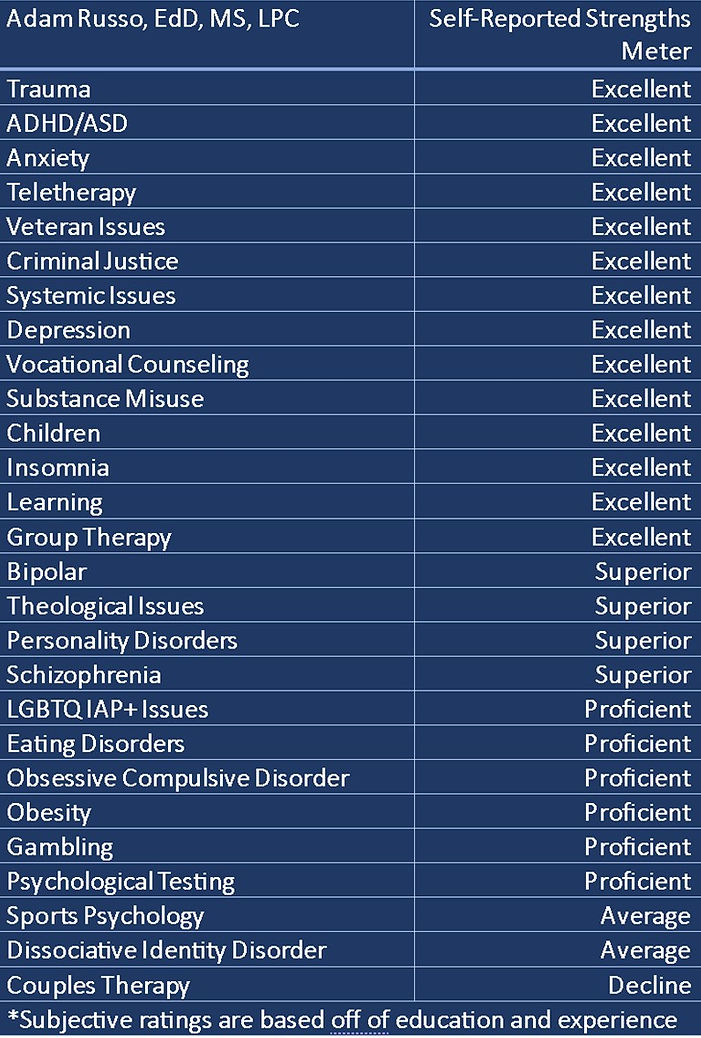
About your Clinician Serving Old Lyme, CT
Adam Russo, EdD, MS, LPC, BS, AS, CTMH, CCTP, ADHD is a Licensed Professional Counselor (LPC). Adam possesses both a masters degree in Professional Counseling -Mental Health from Central CT State University and a doctoral degree in Community Care Counseling and Traumatology from Liberty University. Dr. Russo's undergraduate education includes Public Safety Administration and Criminal Justice degrees. Adam has spent over 11 years being educated and supervised in the behavioral health arena. In total, Adam has over 27 years experience as either an educator, instructor, and mental health worker. Adam is licensed to talk about people's strengths and challenges and help them develop solutions, strategies, or insight into their current situations. Professional Counselors perhaps have the strongest background in treating physical and mental health disabilities and are viewed as most proficient in many forms of individual and group psychotherapy. Counselors also have a strong focus on vocational counseling since much of your identity and purpose lays both in the work or education that you pursue and the people you positively influence in your life.
Previous Clinical Training:
*Completed doctoral-level advanced counseling and traumatology training
*Clinical Trauma Professional (CCTP) International Association of Trauma Professionals
*Clinical Tele-mental Health Certification
*Certified Clinical ADHD Professional Institute of Certified ADHD Professionals
*Intensive In-Home Child and Adolescent Psychiatric Service by Yale University
*Therapeutic Crisis Intervention by Cornell University
*Boys Town Psychoeducation Model of Treatment
*Crisis Prevention Institute training during psychiatric ward experience
Navy Training:
*Basic Enlisted Submarine School
*Apprentice Technical Training (AC/DC Circuitry)
*Tactical Networking and Computer Systems (Information Technology)
*Fire Control Technician Class-A (Submarine Ordinance)
After receiving his honorable discharge with admiral and captain citations, he received his Associates degree in Criminal Justice from Middlesex Community College (Sgt Dingwall Award recipient) and Bachelors Degree from Charter Oak State College in Public Safety Administration. Adam had extensive crisis intervention experience as a Shift Coordinator for a Residential Treatment Facility for serious juvenile offenders. He completed his three semester graduate internship experience at the Rocky Hill Veterans' Home at both their immediate care and former substance rehabilitation programs. Adam also worked as a Lead Counselor for a leading outpatient counseling center for mostly mandated clients and then as an Intensive In-Home Child and Adolescent Psychiatric Service (IICAPS Yale Program for children that may be at risk for inpatient hospitalization) clinician for a leading child psychotherapy provider. Adam has worked as a counselor at a nearby hospital in their adult acute psychiatric inpatient department (“Psych Ward”) helping individuals with acute psychiatric challenges. Adam has completed his education (4.0 final GPA) with a Ed.D. program in Community Counseling and Traumatology.
Some interesting facts about Adam:
-
He worked for the Transportation Security Administration
-
He traveled the world as a Fire Control Technician in the Navy
-
Obtained a Jr. Black Belt in Parker Kenpo Karate as a junior in high school
-
Is a little bit of a nerd! Love electronics, carpentry, mechanics, photography, and electrical
-
Adam is a proud father of two and has been together with his wife for over 19 years!
Why is all of this important?
It has been determined by several research studies (Miller et al.,1997; Miller et al., 1995) that the model and technique a therapist uses only constitutes 15% of overall therapeutic outcomes. 40% was attributed to extra-therapeutic factors (income, transportation, etc.) and 30% was due to the therapeutic relationship you have with your counselor! That means first a foremost, your therapist should be obtainable (e.g. close by, attainable) and perhaps most importantly MUST be someone you like, trust, and think can help you! Does your therapist have a similar culture? Is gender of your therapist important when it comes to trust or previous traumatic experience? Is the model he/she practices in line with your belief system? (e.g. are you the expert of your own life or is the person you are going to be seeing?) These constructs are really important!

